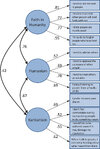A complete guide to the LIGHT TRIAD: understand, recognize, and champion the brighter side of leadership

I once went through a stretch when I had no drive or hope. I stayed in my cabin on a ship for days, barely eating. Music was my distraction from the turmoil I felt. Tears came often in those solitary moments. There seemed to be no way out, and I remember the pain, the isolation, and the doubt. Even twenty years later, that memory remains heavy, and I remind myself of my growth to keep the shadows away.
A single incident triggered it. My supervisor chose to shame me in front of others over a supposed mistake. That day crushed my sense of control and left me utterly lost. Eventually, I discovered leadership has a well-known gloomy side and a contrasting path that is far more heartening. My own journey led me toward a more uplifting view: the Light Triad.
A small office with warm lighting. The leader’s expression is thoughtful and empathetic, suggesting the benevolent aspects of guiding others through respect and care.
In 2019, Scott Barry Kaufman presented research around three traits that encourage positive connections: Kantianism, Humanism, and Faith in Humanity. Collectively, these are often called the Light Triad. It contrasts with the familiar Dark Triad (narcissism, Machiavellianism, and psychopathy). The three Light Triad characteristics include:
• Kantianism: Treating individuals as ends in themselves rather than as tools. People high in Kantianism make an effort to respect each person’s unique value and autonomy. They dislike deception and give honest regard to others’ well-being. This outlook brings out deeper trust and a sense of genuineness in relationships.
• Humanism: Recognizing the inherent worth of everyone. Those who embrace Humanism believe in honoring human dignity and focusing on mutual growth. They exhibit compassion, celebrate others’ achievements, and nurture a climate of inclusion.
• Faith in Humanity: Holding a belief that people are generally good. This outlook encourages understanding, open communication, and kindness. Challenges may still arise, yet those guided by Faith in Humanity tend to face problems with a willingness to support and listen.
Leaders who embody these qualities often foster a climate of respect and empathy. In many organizations, this approach brings lasting success and nourishes the minds and hearts of teams. Some might say that’s an idealistic dream, but it’s also grounded in practical outcomes when carefully put into practice.
A person standing at the center of a welcoming office. Light streams in through windows, and the individual greets team members with kindness and generosity.
There are reasons, though, why certain leaders adopt a harsher style. The Dark Triad—narcissism, Machiavellianism, and psychopathy—has often been linked to rapid professional rises. The confidence, calculated manipulation, and willingness to take risks can look appealing in cutthroat settings. These leaders sometimes gain short-term advantages: big wins, bold decisions, or popularity built on a commanding presence. In truth, that success can rest on shaky ground and may collapse if empathy and conscience are neglected.
Some studies highlight how traits connected to the Dark Triad might spark short bursts of ambition and fearless action. Yet this outlook can damage trust, loyalty, and genuine collaboration over time, turning workplaces toxic. The Light Triad doesn’t always bring instant gratification, but it tends to foster deeper stability, greater morale, and a balanced way of moving forward.
For those trapped with an overbearing leader, it helps to recognize that another path exists. Even a single moment of empathetic leadership can restore hope, the way a small beam of light can brighten a dim room. Focusing on kindness, respect, and trust forms the base of true teamwork. My own experiences showed me that the sun can reappear after a storm, and a compassionate approach transforms not only the leader’s style but everyone around them.
Individuals who lead with empathy and honor for others often foster stronger teamwork and a sense of shared motivation. Research by Scott Barry Kaufman, David B. Yaden, Elizabeth Hyde, and Eli Tsukayama (2019) in their paper “The Light vs. Dark Triad of Personality: Contrasting Two Very Different Profiles of Human Nature” showed that people who emphasize qualities like Kantianism, Humanism, and Faith in Humanity—sometimes grouped as the Light Triad—tend to display deeper fulfillment in social settings, lower aggression, and higher life satisfaction. These findings point toward the advantages of uplifting traits, even when faced with competitive demands.
Similar studies have linked traits such as respect, fairness, and openhearted listening to improvements in organizational well-being. In a Journal of Applied Psychology article by Kim Cameron and colleagues (2011), teams led by a “positive leadership” style saw better productivity and trust. Their data suggested that nurturing members’ strengths often leads to higher morale and steadier performance, far more so than fear-based methods.
Leaders guided by the Light Triad approach also encourage healthier communication. Findings shared in the Leadership Quarterly by Hannah et al. (2020) noted that those who avoid manipulation and instead treat collaborators with honesty cultivate more engaged teams. These teams frequently report lower turnover intentions and a greater belief in shared goals, which enhances long-term success.
Evidence shows the downsides of harsh leadership. Short bursts of success might arrive when leaders rely on intimidation or cunning, yet the strain on employee mental health and the erosion of loyalty often bring hidden costs. Over time, such an approach can spoil morale, provoke frequent resignations, and damage the group’s overall results. In contrast, leaders who choose kindness, honesty, and genuine care typically gain more stable outcomes.
The message of these studies is direct. Relying on the Light Triad sets a groundwork of respect and shared progress, whereas the darker route can yield quick but fragile gains. Teams perform best when given support and thoughtful guidance rather than fear or manipulation.

I once went through a stretch when I had no drive or hope. I stayed in my cabin on a ship for days, barely eating. Music was my distraction from the turmoil I felt. Tears came often in those solitary moments. There seemed to be no way out, and I remember the pain, the isolation, and the doubt. Even twenty years later, that memory remains heavy, and I remind myself of my growth to keep the shadows away.
A single incident triggered it. My supervisor chose to shame me in front of others over a supposed mistake. That day crushed my sense of control and left me utterly lost. Eventually, I discovered leadership has a well-known gloomy side and a contrasting path that is far more heartening. My own journey led me toward a more uplifting view: the Light Triad.
A small office with warm lighting. The leader’s expression is thoughtful and empathetic, suggesting the benevolent aspects of guiding others through respect and care.
In 2019, Scott Barry Kaufman presented research around three traits that encourage positive connections: Kantianism, Humanism, and Faith in Humanity. Collectively, these are often called the Light Triad. It contrasts with the familiar Dark Triad (narcissism, Machiavellianism, and psychopathy). The three Light Triad characteristics include:
• Kantianism: Treating individuals as ends in themselves rather than as tools. People high in Kantianism make an effort to respect each person’s unique value and autonomy. They dislike deception and give honest regard to others’ well-being. This outlook brings out deeper trust and a sense of genuineness in relationships.
• Humanism: Recognizing the inherent worth of everyone. Those who embrace Humanism believe in honoring human dignity and focusing on mutual growth. They exhibit compassion, celebrate others’ achievements, and nurture a climate of inclusion.
• Faith in Humanity: Holding a belief that people are generally good. This outlook encourages understanding, open communication, and kindness. Challenges may still arise, yet those guided by Faith in Humanity tend to face problems with a willingness to support and listen.
Leaders who embody these qualities often foster a climate of respect and empathy. In many organizations, this approach brings lasting success and nourishes the minds and hearts of teams. Some might say that’s an idealistic dream, but it’s also grounded in practical outcomes when carefully put into practice.
A person standing at the center of a welcoming office. Light streams in through windows, and the individual greets team members with kindness and generosity.
There are reasons, though, why certain leaders adopt a harsher style. The Dark Triad—narcissism, Machiavellianism, and psychopathy—has often been linked to rapid professional rises. The confidence, calculated manipulation, and willingness to take risks can look appealing in cutthroat settings. These leaders sometimes gain short-term advantages: big wins, bold decisions, or popularity built on a commanding presence. In truth, that success can rest on shaky ground and may collapse if empathy and conscience are neglected.
Some studies highlight how traits connected to the Dark Triad might spark short bursts of ambition and fearless action. Yet this outlook can damage trust, loyalty, and genuine collaboration over time, turning workplaces toxic. The Light Triad doesn’t always bring instant gratification, but it tends to foster deeper stability, greater morale, and a balanced way of moving forward.
For those trapped with an overbearing leader, it helps to recognize that another path exists. Even a single moment of empathetic leadership can restore hope, the way a small beam of light can brighten a dim room. Focusing on kindness, respect, and trust forms the base of true teamwork. My own experiences showed me that the sun can reappear after a storm, and a compassionate approach transforms not only the leader’s style but everyone around them.
Individuals who lead with empathy and honor for others often foster stronger teamwork and a sense of shared motivation. Research by Scott Barry Kaufman, David B. Yaden, Elizabeth Hyde, and Eli Tsukayama (2019) in their paper “The Light vs. Dark Triad of Personality: Contrasting Two Very Different Profiles of Human Nature” showed that people who emphasize qualities like Kantianism, Humanism, and Faith in Humanity—sometimes grouped as the Light Triad—tend to display deeper fulfillment in social settings, lower aggression, and higher life satisfaction. These findings point toward the advantages of uplifting traits, even when faced with competitive demands.
Similar studies have linked traits such as respect, fairness, and openhearted listening to improvements in organizational well-being. In a Journal of Applied Psychology article by Kim Cameron and colleagues (2011), teams led by a “positive leadership” style saw better productivity and trust. Their data suggested that nurturing members’ strengths often leads to higher morale and steadier performance, far more so than fear-based methods.
Leaders guided by the Light Triad approach also encourage healthier communication. Findings shared in the Leadership Quarterly by Hannah et al. (2020) noted that those who avoid manipulation and instead treat collaborators with honesty cultivate more engaged teams. These teams frequently report lower turnover intentions and a greater belief in shared goals, which enhances long-term success.
Evidence shows the downsides of harsh leadership. Short bursts of success might arrive when leaders rely on intimidation or cunning, yet the strain on employee mental health and the erosion of loyalty often bring hidden costs. Over time, such an approach can spoil morale, provoke frequent resignations, and damage the group’s overall results. In contrast, leaders who choose kindness, honesty, and genuine care typically gain more stable outcomes.
The message of these studies is direct. Relying on the Light Triad sets a groundwork of respect and shared progress, whereas the darker route can yield quick but fragile gains. Teams perform best when given support and thoughtful guidance rather than fear or manipulation.



